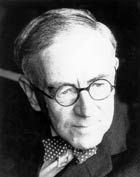
|
Home DH-debate 2. Versailles and the Munich Settlement |
| 1. Introduction | 2. First World War |
| 3. Europa and China | 4. Between The Wars |
| 5. Peoples Self-Determination | 6. Historical Borders |
| 7. Literature |
The start of the Second World War in 1939 was due to political and diplomatic mistakes and blunders on both sides.

The English Historian A. J. P. Taylor 1906-1990. This series of articles is basically based on his book "The Origins of The Second World War". However, not so much in this introductory article as in the following.
It is customary to place the entire responsibility for the Second World War on the Germans and Hitler. The German Fuhrer was a demonic dictator, who from the very beginning had a plan for the conquest of
the World. The democratic nations had no other options than bravely to stand up against this empire of evil. Therefore the politicians and their voters cannot be blamed for this worldwide disaster.
The British historian A. J. P. Taylor published in 1961 a book, "The
Origins of the Second World War". After thorough studies of the diplomatic correspondence, key persons' memoirs and many other sources of history, he came to the conclusion that no one wanted World War II, neither Hitler nor the Western politicians.
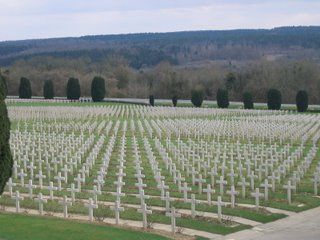
Soldier graves at Verdun - Champs de Bataille.
History is the essence of our collective experiences, which we have bought with such great sufferings, and if we do not learn from history, all these young men's lives will truly have been wasted.
Hitler had no timetable for the world conquest, Taylor wrote, he was an opportunist like most other politicians. He made a move and then judged the opportunities that showed up.
The war, that began in 1939, was far from premeditated; it was a mistake, the result of diplomatic blunders on both sides. (Taylor, p. 269)
The responsibility for the war rests not only on Adolf Hitler; It also rests the responsible politicians in the democratic states and the voters, who chose them.
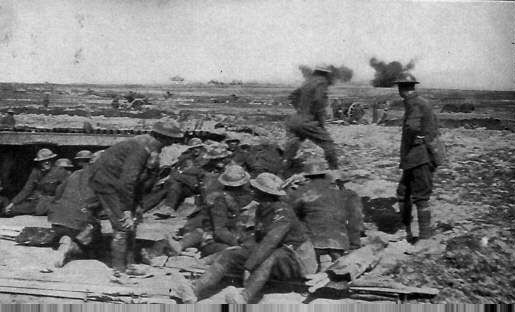
English soldiers at Verdun.
The road from Denmark to Paris passes through northern France and Flandern. Here are the endless cemeteries with fallen soldiers from the First and Second World War. Here lies the city of Verdun, which in 1916 caused the lives of more than a quarter of a million soldiers.
When we come this way, we will park the car and for a while go around between the white crosses. It is the least we can do for all these young men, for whom it all ended so early.
Once I spoke with a farmer from South Jutland. His father had been a German soldier in the first World War. He survived four years at the front. When he came home from the war, he married, had children and started to manage the family farm. He never talked about the years in the trenches. The only thing, that his children ever heard him say about the war, was that when his unit was transferred from the Eastern Front to the Western Front, he heard a church bell ring New Year's Eve at midnight.
All Across Europe, we are reminded of those, who died in the great
wars.
English village churches have at least two large boards on the wall. One with a long list of men from the village, who fell in the first World War, and another with the names of those, who fell in the second World War. Thus also in the rest of Europe. In Northern Italy, they commemorate all those, who did not come home from the Eastern Front, and those who fell during the following partisan war. In the village cemeteries in southern Jutland, the names of the young men of the village, who died in the great wars, are listed.
Was it really necessary? Were there no other options?
It is commonly believed that the First World War started by mistake.
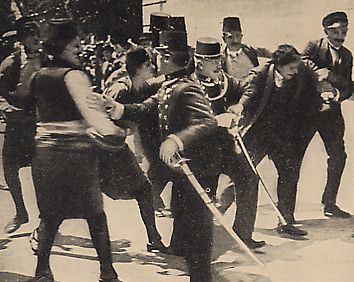
Gavrillo Princip is arrested after the assassination.
On 28 June 1914, the Austro-Hungarian crown prince, Franz Ferdinand, was shot in Sarajevo by the Serbian student, Princip. He belonged to a group, who called themselves "The Black Hand". The terrorist group was quickly unraveled, and the evidence pointed toward the neighboring state, the kingdom of Serbia. Austria-Hungary demanded that the Serbian government should launch an investigation of the terrorist groups' activities, but the Serbs rejected. Germany urged Russia, which was an ally and protector of Serbia, to press the Serbian government to its senses, but this was ignored. Austria-Hungary delivered a memorandum to Serbia, where they demanded that the Serbian government should dissolve the Serbian-national terrorist networks and show good neighborly relations with Austria- Hungary. The Serbs accepted all of this Memorandum's ten points except one. Nevertheless, Austria-Hungary declared war against Serbia. The Russians mobilized in support of their Serbian ally. Austria-Hungary's ally Germany then declared war against Russia and its ally France. The Germans advanced through Belgium, which brought England into the war.
Throughout this process, there were many times, where diplomats and politicians could have sat together and negotiated a settlement, which benefited their respective interests taking into consideration the Powers' relative strengths. But anyone, who comes with hat in hand asking for negotiations, already shows weakness and thereby had weakened his bargaining position in advance. All the powers overestimated their own positions and expected their adversaries to take the initiative to negotiations. One step led to another until a full-scale European war was a fact.
The start of the Second World War in 1939 was also a result of a failed foreign policy and diplomatic blunders. The democratic politicians allowed themselves to be guided by emotions and moral attitudes among their voters. They did not feel themselves in a position that permitted them to pursue real policy.
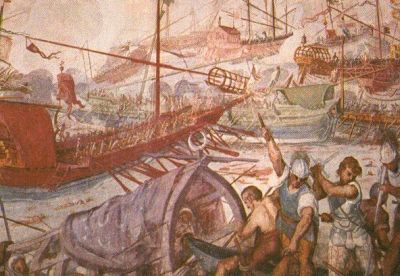
The sea battle at Lepanto.
Unlike many other parts of the world, Europe is a patchwork of independent republics and kingdoms. This is because, during
European history the dominant powers always have been matched or defeated by a coalition of smaller powers.
The Turks' expansion into Europe was halted in 1571 by a coalition
of Spain, the Italian city-states, the Vatican, the Duchy of Savoy
and the Knights of St. John in the sea Battle of Lepanto. The Habsburg domination in Europe was stopped in the Thirty Years' War, 1618-48, by the Protestant monarchs of Denmark and Sweden and a France led by Cardinal Richelieu. In 1683 the Turks again were defeated by an alliance of Polish, Austrian and German forces in the Battle of Vienna. Napoleon suffered his Waterloo in 1815 against a coalition of British, Russian and Prussian forces. In World War I, the Entente was under strong pressure from the Central Powers, but the financial support of the Americans and their subsequent arrival at the European war scene in May 1918 turned the fortunes of war in their favor.
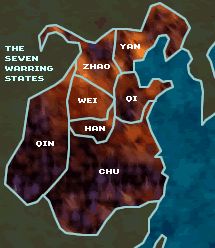
The seven original Chinese states.
In China, the history developed differently. The period from 500 BC
to 221 BC is called "The period of the Warring States". Present China was by that time divided among seven equally strong rivalizing states, Zhao, Yan, Qi, Wei, Han, Chu, and Qin. A situation which we recognize from classical Greece and from European history. However, very early the state of Qin built up a strong economic base through the construction of dams and irrigation works in their hinterland in the Wei valley and the Sichuan Chengdu plain. Then they became able to conquer the other Chinese states one by one. Because of their rivalry, they never succeeded in building a coalition, that could withstand Qin. Therefore, China in contrast to Europe became one empire already in 221 BC.
It is often stated - for example, as an argument for the enlargement of the EU responsibilities - that it is the existence of the European nation states that is to blame for the wars, and if the nation states were broken down, wars will no longer occur. But China's nation states collapsed more than two thousand years ago and this part of the world has since experienced at least as much war and destruction as Europe.
On the contrary, it can be said that the nation states limited the wars in Europe. For example, Switzerland, Sweden, Portugal, and Spain could stay out of the wars because they were nation-states declaring neutrality, while the rebels of Taiping, Dungas, Boxer, and Communist Mao Zedong invaded the parts of China they pleased.
In the wake of the Napoleonic wars the German romantic movement with its idea about a nation, that should be common for all German-speaking peoples, emerged in Europe; "Deutschland uber Alles" was the motto. In 1871 the patchwork of German states and principalities became united in the "German Empire" under Emperor Wilhelm 1. with Otto von Bickmark as Chancellor. This disturbed the political equilibrium of Europe. The new Germany was a very strong economic and therefore also military power that could match almost any coalition of smaller powers. The very existence of a united Germany gave notice of a new more united Europe.
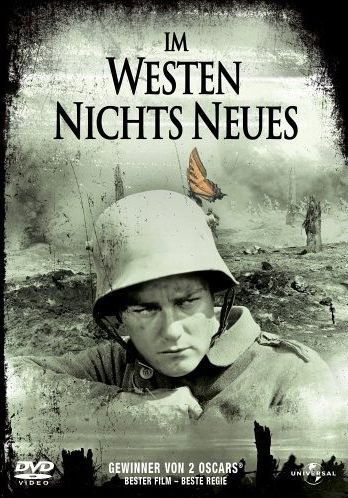
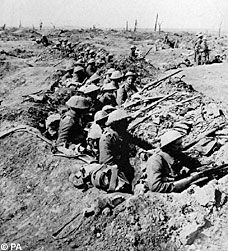

|
Left: All Quiet on the Western Front by Eric Maria Remarque as black and white film.
Mid: Somme 1916.
Right: All Quiet on the Western Front by Eric Maria Remarque - the original novel.
In the First World War the Central Powers, essentially the two German-speaking nations of Germany and Austria-Hungary and Turkey, fought against the Entente Powers, which consisted of France, Britain, Russia, Serbia, Italy, Belgium and Romania and several others.
In 1918 the great European war had lasted for nearly four years. Both the Central Powers and the Entente were brought to their knees, both morally and economically. Millions of soldiers had fallen in an exhausting trench warfare. Then the Americans arrived on the battlefield with fresh troops in May
1918 and made the conclusion.
It seems likely that the Americans' real war goal in 1918 was to ensure that Europe also in the future would continue to be split into many rivalizing nations. In this way, Europe would not be a competitor to the U.S. in the global political arena in any near future.
It was a "war to make the world safe for democracy," said Woodrow Wilson. But if that were the case, the U.S. joined the war on the wrong side. Britain and France ruled hundreds of millions of people - in Africa, India and Southeast Asia - with no democracy. Germany, however, was also a democracy and had only a few colonies.
The first World War had been a disaster for all participating nations. Every family had lost a son, a father, a brother or an uncle in the war.
The mood in interwar Europe was strongly opposed to any kind of war. Books like Hemingway's "A Farewell to Arms" and the forever outstanding anti-war novel, Eric Maria Remarque's "All Quiet on the Western Front" were bestsellers.
The poems of the English poet Wilfred Owen became popular:
|
What passing-bells for these who die as cattle? |
|
I am the enemy you killed, my friend. |
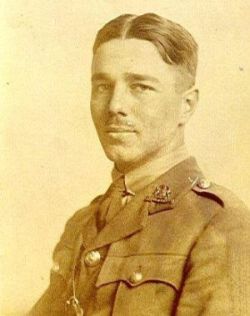
Wilfred Owen 1893 - 1918.
Owen was killed in action on 4. November 1918 in the Battle of Samber-Oise Canal in Northern France, just one week before the end of the war. He became 25 years old. The notice of his death reached his family, while the church bells sounded to mark the Armistice.
Such was the mood in interwar Europe. "Our goal is peace for almost any price", as Anthony Eden said (Taylor p. 166). And it was really a quite honorable stand.
In interwar Europe, there was a much popular support to the principle of the peoples' self-determination. It was conceived as a far more modern and just solution to border problems between nations than actions of war.
You only have to ask the people themselves, who lived in the disputed area, to which nation they wanted to belong: it was that simple.
There were great hopes and expectations for the "League of Nations" in Geneva, as an institution, which could decide international disputes without war in a fair and just way.
|
|
When one finds it confusing, difficult and even inappropriate to analyze the details of a specific case, one can cut through and use a principle.
The principle of border demarcation on the basis of national self-determination was introduced by U.S. President Woodrow Wilson. He brought it with him to Europe in 1918.
"We are glad - to fight thus for the ultimate peace of the world and for the liberation of its peoples - for the rights of nations great and small and the privilege of men everywhere to choose their way of life and of obedience. - We are but one of the champions of the rights of mankind. We shall be satisfied when those rights have been made as secure as the faith and the freedom of nations can make them." (Woodrow Wilson in a speech to the Congress, 2 April 1917)
Woodrow Wilson used the principle of national self-determination to divide the Empire of Austria-Hungary, the German empire and the Ottoman Empire into many smaller nations. Many new nations came into existence in connection with the conclusion of the war and the peace treaty in Versailles. In Europe, it was Poland, Czechoslovakia, Hungary, Austria, and Yugoslavia. However Finland, Estonia, Latvia and Lithuania won their independence also in 1918 in connection with the Brest-Litovsk Peace between Russia and Germany.
Most likely the US entered the war to support the weaker part and thereby preserve Europe as a multitude of rivalizing nations, which put the continent out of the game in the struggle for world domination.
On the American continent there had never been any peoples' self-determination. When the American South in 1861 declared itself as an autonomous federation, Washington responded consistently with military force.
Thanks to the principle of the peoples' self-determination Denmark got Northern Slesvig back in 1920.
|
|
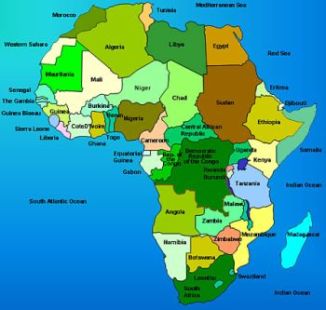
When the "king of kings", Haile Selassie of Ethiopia, spoke to the
assembly at the opening session of the "Organization of African Unity" in Adis Ababa in 1963, he stressed that the African nations necessarily must follow the principle of respect for historical borders. The African borders had been drawn by the colonial powers completely without any account of the people's tribal affiliation. They often follow different longitudes and latitudes. Countless people and tribes have been divided by shared borders. If any African nation puts in question these borders it will trigger an unmanageable chaos. Only by consistently respecting the honored historical borders, peace on the continent could be preserved.
It seems like the assembly took the words of the emperor to their hearts. Only in the dispute over Western Sahara and in connection with Ethiopia's relations with its muslim neighbors, Somalia and Eritrea, the border has been questioned in modern time.
Switzerland is another good example of the principle of respect for
historical boundaries. There is no genuine Swiss language. Here are populations that from ancient times have spoken both German, French and Italian. But you have never heard of French-speaking Swiss who did demonstrate for a closer connection to France, or German-speaking Swiss who had made riots because they wanted to belong to Germany. They are all happy to be precisely Swiss.
|
The Last Liberal Historian: A. J. P. Taylor Nekrolog over A. J. P Taylor. A. J. P. Taylor's railroad timetable theory "How Wars Begin". Poems by Wilfred Owen Poet's Corner. Første Verdenskrig - De Sønderjyske krigsdeltagere, Breve, som soldaterne sendte hjem - I Farfars Fodspor. Literatur: "The Origins of The Second World War" af A. J. P. Taylor - Penguin Books. |
| To start |